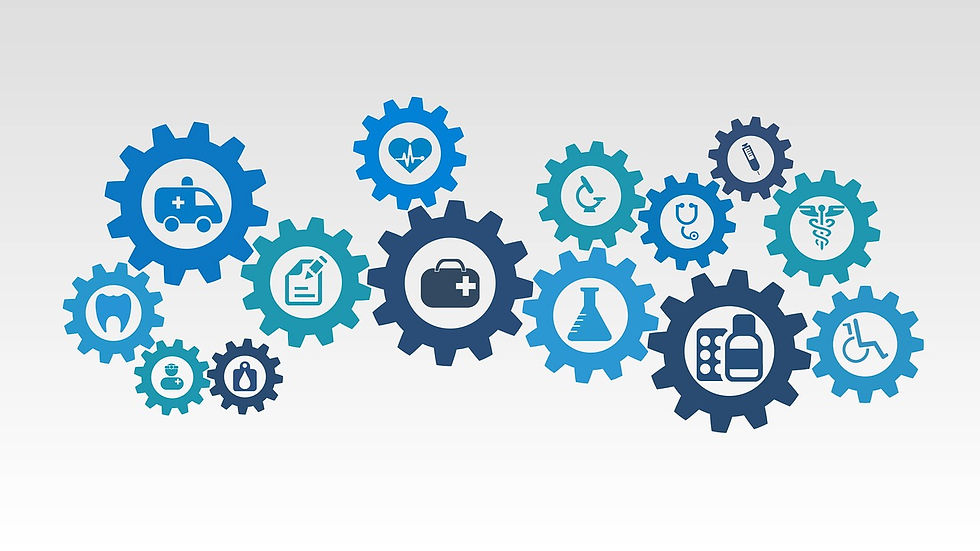Separating the Personal from the Professional: My Social Media Plan
- ALeeRDH

- May 7, 2019
- 3 min read
Updated: Jul 30, 2019

What is an appropriate social media presence?
The World Health Organization (2010) defines health literacy as “the cognitive and social skills which determine the motivation and ability of individuals to gain access to, understand and use information in ways which promote and maintain good health” (para. 1). Social media is a prominent method for the public to share information, thus being a useful medium for health information dissemination.
How can we choose what is appropriate to share on social media? Currently, the public is very reactive to content that is shared; this can be positive or negative. In the case of the “health-care crisis” in Nova Scotia, many public out-cries have been made using social media. One example is the viral video by Inez Rudderham. Her story has been shared by thousands of people, and Nova Scotia’s Premier, Stephen MacNeil acknowledged her concerns; He indicated that the health care system has its “challenges” and that work is being done to improve the system (Prentiss, 2019). This was a positive outcome from information shared on social media.
On the other hand, information shared on social media can receive negative reactions. The article shared in our suggested learning sources “Nurse who 'vented' online found guilty of professional misconduct” is an example of this. The nurse’s ethical standards were negated by her post, and she was disciplined for her actions.
In my opinion, a social media presence as a health professional needs to be factual, not emotional. When I share information on LinkedIn for example, it is to spread oral health knowledge.
How does your response consider professional ethical standards?
As a dental hygienist, I adhere to the Dental Hygienists’ Code of Ethics created by the Canadian Dental Hygienists Association (CDHA), which has five principles:
· beneficence – caring and acting to promote the good of another
· autonomy – the right to make one’s own choice
· integrity – doing what is right with honesty and truthfulness
· accountability – taking responsibility for one’s own actions
· confidentiality – hold information obtained in a professional relationship secret
When I post health information on social media, I aim to adhere to these principles. Confidentiality is the most important principal relating to social media use. The CDHA Dental Hygienists’ Code of Ethics (2012) states “Dental hygienists understand and respect the potential of compromising confidentiality when connecting with clients through social networks or other electronic media.” (p. 9). For this reason, I have chosen not to contact any clients on social media; I do, however, offer social media sources for oral health information to my clients at their appointments.
As a professional are you obligated to speak up in public?
As a health care professional, and oral health promoter, I do feel I have the obligation to share information about oral health. The general public may not know which sources are trust worthy, or even up to date for health information. For oral hygiene, I have access to sources that the general public may not think to access. This is particularly useful for trends and fads. For example, activated charcoal is a new product that many people are trying, specifically to whiten their teeth. I have seen in private practice that it is capable of removing surface stain, but can also damage enamel integrity and become embedded in gingival tissue. In an effort to protect people from potential detrimental effects of activated charcoal, I provide this information to my friends on Facebook and to my clients in office; This gave me peace of mind that they knew the potential risks associated and could exercise their autonomy.
Now that I am active on Twitter, I hope to use it as a new source to spread oral health knowledge. If you haven’t already, please follow me on Twitter @ALeeRDH.
References:
Canadian Dental Hygienists Association. (2012). Dental Hygienists’ Code of Ethics [PDF file]. Retrieved May 10, 2019 from https://www.cdha.ca/pdfs/Profession/.../Code_of_Ethics_EN_web.pdf
Prentiss, M. (2019, April 30). Cancer survivor who dared premier for meeting in viral video gets her wish. CBC. Retrieved May 10, 2019, from https://www.cbc.ca/
World Health Organization. (2010, December 09). Track 2: Health literacy and health behaviour. Retrieved May 10, 2019, from https://www.who.int/healthpromotion/conferences/7gchp/track2/en/



Comments